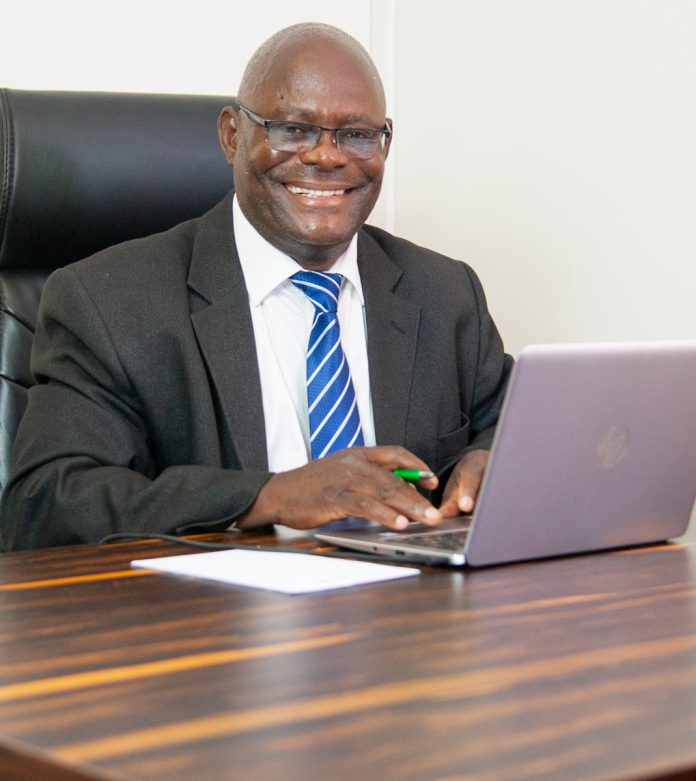Mining industry stalwart Dr Godwin Beene has been appointed Country Manager of First Quantum Minerals in Zambia, taking over from General Kingsley Chinkuli, who will continue with the company on an advisory basis.
Previously working as Government Affairs Specialists at FQM, Dr Beene has helped forge the path to positive, steady relationships between the government and the mining industry, offering vital support to outgoing FQM Country Manager General Chinkuli, and ensuring that policies are aligned for a ‘win-win’ outcome.
Having served as Permanent Secretary in the Ministry of Mines from January 2009 to November 2011, and currently serving as President of the Zambia Chamber of Mines, Dr Beene is well-equipped for the job at hand, bringing to the table both industry expertise and the necessary familiarity with government operations and structures. He believes that the mining industry, though oftentimes at the centre of controversy, is the lifeblood of the Zambian economy.
Born in 1954 in the Makala Village of Monze District, Southern Province, he started his primary education in 1961 under the Federal Government Education System and completed his secondary education at St Edmund’s Secondary School, a top secondary school in Southern Province, in 1975. He then earned a Mining Industry scholarship and achieved an undergraduate degree in Chemical Engineering at Swansea University in the UK, in 1981.
Dr Beene began his working life in 1981 when he joined the then-largest hydrometallurgical plant in Africa, Nchanga Tailings Leach Plant, as a graduate metallurgist. He rose to the position of Senior Assistant Metallurgical Engineer in 1984.
In the same year, he benefited from a two-year Beit Trust scholarship and returned to his alma mater as a research fellow to study for an MSc degree. In January 1988, he was awarded a PhD in Chemical Engineering, after completing his thesis in the field of Surfaces and Colloids by developing a model to predict the behaviour of a mineral system under a prescribed environment.
“It is an honour and a privilege to be given this opportunity to run the Country Office of such a great company, which is also Zambia’s largest taxpayer with contributions to the national treasury exceeding US$5.6 billion,” he said.
“My role will be to work with the teams both at our Kansanshi and FQM Trident mines in a proactive manner to improve and maintain a good and constructive working relationship with the government, other industry players, and all stakeholders directly or indirectly affected by our mining operations, while safeguarding the interest of First Quantum Minerals Limited. Being familiar with how government structures operate is critical for this job. In addition, it is important to appreciate the operations of NGOs and CSOs, and how their mandates and operations influence public opinion of the industry and the government’s fiscal regime policy. The thrust is to win greater support from these organizations for the company and the industry in general” said Dr Beene.
Dr Beene is also credited as one of the founders of the modernised Engineering Institute of Zambia. In 1989, along with colleagues, he set out to restructure the institute, originally established in 1955. He took on the mantle of Secretary of the Institution, running the Secretariat from his study room at home for nearly 10 years, “Working closely with another visionary engineer, over a period of fourteen years we transformed the professional body to what it is today – the Engineering Institution of Zambia with its Engineering Registration Board.”
FQM operates three mines in Zambia: Kansanshi Mine in Solwezi, of which ZCCM-IH owns a 20 per cent stake, and Sentinel and Nickel Mines at Kalumbila about 150km northwest of Solwezi. The mines mainly produce copper and nickel and are in North-Western Province.
Since its inception, First Quantum Minerals has created over 19,000 jobs in Zambia and injected over US$7.5 billion into the local economy.
Dr Beene further said that hugely-important enablers to the sustainability of the Zambian mining sector are stable policies and a competitive tax regime. He strongly advocates “Skills Without Boarders” to allow specialist skill sets simply not yet found in Zambia to come in and upskill local technocrats, train graduates and prepare them to take engineering positions in any mine in the world. “I am always excited when I hear our Zambian technocrats moving to operations elsewhere as this demonstrates how well we train them here in Zambia. As they leave, we receive freshers and train them. I think this a good thing” says Dr Beene.
Dr Beene explained that if a mining firm’s investments are properly and intelligently marshalled, the sustainability of the communities is a direct spin-off. FQM in particular has invested heavily in the communities in which it operates, and this has included improving access to quality health care by building health posts, sponsoring HIV/AIDS and malaria prevention programmes as well as agricultural improvement initiatives, community infrastructure development, gender equality programmes, and wildlife protection.
The company has spent over US$100 million on its sustainability and community development programmes, aligning its programmes to the United Nations Sustainable Development Goals to deliver tangible social improvement to thousands of Zambians








